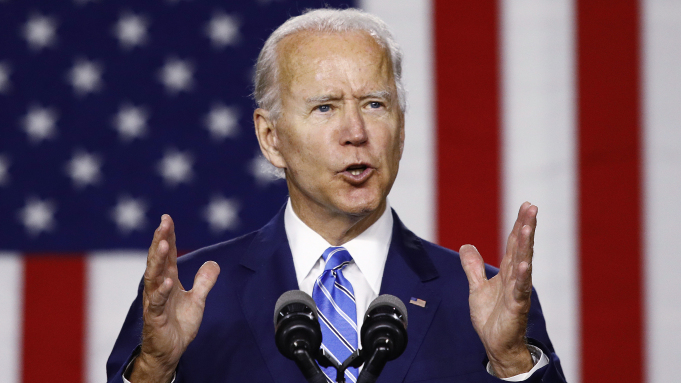U.S. tells Israel to boost Gaza aid or risk military aid suspension
The Joe Biden administration intensified pressure on Israel this week to improve dire conditions for civilians in the Gaza Strip, as top officials warned they would resort to punitive measures, potentially including a suspension of military aid, if humanitarian aid flows are not increased within a month. In an Oct. 13 letter to senior Israeli […]

Joe Biden
The Joe Biden administration intensified pressure on Israel this week to improve dire conditions for civilians in the Gaza Strip, as top officials warned they would resort to punitive measures, potentially including a suspension of military aid, if humanitarian aid flows are not increased within a month.
In an Oct. 13 letter to senior Israeli officials, Defense Secretary Lloyd Austin and Secretary of State Antony Blinken demanded urgent steps to ensure noncombatants have access to food and other necessities, blaming actions by the Israeli government and lawlessness in Gaza for a recent deterioration of conditions there.
Absent a change, they cautioned, the administration would be obliged to take steps laid out in laws and policies linking the facilitation of humanitarian aid during wartime and the compliance with laws of war, including the protection of civilians, to the provision of U.S. arms and military assistance.
While the letter from Austin and Blinken, addressed to Israeli Defense Minister Yoav Gallant and Minister for Strategic Affairs Ron Dermer, does not explicitly reference a possible suspension of arms transfers, it represents an implicit warning that the United States could curtail or halt those shipments if Israel does not ensure that desperate Gazans can access food, medicine and other necessities.
- Zelensky rules out ceding territory to Russia
- NUC approves programmes for Psycho-Spiritual Institute of Lux Terra Leadership Foundation
“We’re looking to see concrete measures taken to address the humanitarian situation in Gaza, which we know continues to be an issue,” the Pentagon’s deputy press secretary, Sabrina Singh, told reporters. “We want to see… that they’re considering civilians in the battle space, and that’s what we’ve said from the beginning.”
The United States is by far Israel’s largest external backer, providing the country $3.8 billion a year in military aid.
An Israeli official, speaking on the condition of anonymity to discuss sensitive communications between the two governments, said the correspondence is being “thoroughly reviewed.”
“Israel takes this matter seriously,” the official said, “and intends to address the concerns raised in this letter with our American counterparts.”
Critics of President Joe Biden’s handling of the conflict in Gaza — where more than 40,000 people have died in the past year of conflict, according to local health authorities — have blamed him for not effectively leveraging American support to persuade Israel to comply with U.S. demands for an end to the violence in Gaza and a steady flow of food and other aid supplies.
Since the war began, Biden has halted only one shipment of U.S. weapons bound for Israel. In May, the president decided to continue the flow of arms despite an administration review that found Israel had contributed significantly to the insufficient flow of aid to Palestinian civilians.
The letter follows a similar message Blinken sent the Israeli government in April, which officials said resulted in a temporary improvement in aid flows into the battered enclave. But the picture in Gaza has darkened once more in recent weeks, as Israeli officials have returned to areas where they cite the resilience of Hamas, particularly in the battle-ravaged northern areas.
According to the U.N. Office for the Coordination of Humanitarian Affairs (OCHA), no food has entered northern Gaza since early October, increasing the risk of famine amid what it has described as an Israeli “siege” of the area.
Residents who have been displaced multiple times have fled parts of northern Gaza once more in the past week amid a renewed Israeli offensive in the area.
The Israeli military office that oversees aid distribution in Gaza, COGAT, has denied that Israel has halted the entry or coordination of aid in northern Gaza.
Israeli officials have acknowledged shortfalls in the delivery of aid since the beginning of the conflict but primarily blame Hamas and criminal gangs for the problems.
